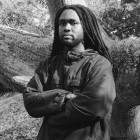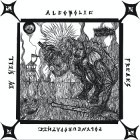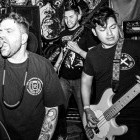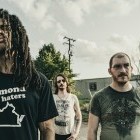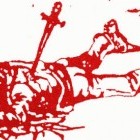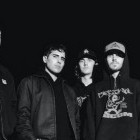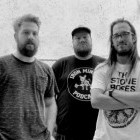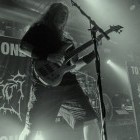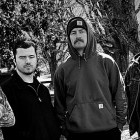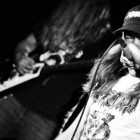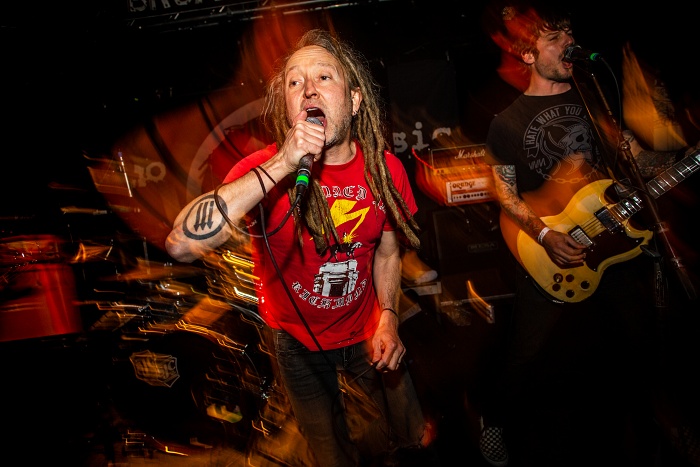
I first encountered Strike Anywhere back in 2000 when I booked a show for them in Ohio with Scumbrigade and Dillinger Four purely on the pedigree that it was Thomas from Inquisition’s new band.
I actually ended up being out of town for that show and it would take me until 2003 to finally see them playing in a basement in West Philadelphia and was blown away - combining speed and anthemic melody they were a total powerhouse that reminded me of the first time I saw Propaghandi.
Like those Canadians, they have lyrical approach rooted in a hope for a better and more just world. Given that they just dropped their first new material in nearly a decade, I figured a conversation with my old friend was in order - so here’s my chat with Strike Anywhere vocalist Thomas Barnett.
My first trip to Richmond was in 1993, when you booked a show for my band at Taylor Steele’s old house, 805 Cary, and he ended up being our realtor 25 years later...
I think Taylor was in a dream that I had last night, and we’re just wandering around Richmond, and it’s a timeless spot in the landscape of my subconscious, where Taylor Steele always emerges. [laughter] So he came to the garage where Inquisition had their first practices, back when I was 18, in ‘91, I guess.
And he just sat in and watched us, and it was awesome, and we’d all been friends with him, he had always been a very public supporter of the young local kids.
Because Richmond also, half of the punks, and hardcore, and art scene at least were always, at least in the first two generations, in the ‘80s, from out of town. And most of the punters, just a random audience, and skate rats, and other folk, were locals. And so you could almost see that kind of cliché divide start to think about happening, but it never did, because we had Taylor and he was local.
Really, the rules were that kids would come down from Virginia, get a punk house, shit was awesome, and we all needed that in a way, as townies. And it was just new ideas, lifeblood. Probably a lot of the parts of Richmond’s punk culture that, in a weird way, are an impressionistic mirror of DC., came from that cross-pollination.
Are you the only person who doesn’t live in Richmond, or are other people spread out as well?
So, Eric and Mark and Garth are all Richmond guys, I mean they live there now, and Matt Smith lives in Carolina Beach, which is south of Wilmington, on the coast. And then I live here. So yeah. Garth grew up in Canada till he was 12, but then he moved to Richmond and was in the same Henrico County Public School world that I was dropping out of at the time.
And then Mark and Eric are from Fairfax, in the middle of Virginia, so they were teenagers in different incarnations of a DC scene. And Matt Smith is from Williamsburg, but he came to go to school in DC. So anyway, that’s how we all met.
But yes, three of us are in Richmond right now. I moved there back in ‘11 for a whole year to take care of my dad when he had cancer, and that was really interesting ‘cause I hadn’t lived there in eight years, but I passed through the city many, many times a year.
I’d do all kinds of walks through Church Hill, go by the old house, see a lot of the changes that you’re living in now. That’s something I’m super interested in. Were there any of the protests that went through Church Hill or did it stay in the Fan?
Most of that stuff that’s happened, it’s been concentrated in the Fan. It’s weird because the way things are communicated now, I didn’t even know about it until Amanda and I were just taking a walk with the dogs and then we were like, “Oh, there’s a march.”
But yeah, it hasn’t really happened that much here. There was a big crowd the other day when they took down the Soldiers and Sailors monument on Libby Hill. And that was cool. And the thing is, it’s a really interesting experience watching these changes, knowing about Richmond’s history and just seeing it happen in real time. I can only imagine, you grew up in the shadow of these monuments like a lot of people, so...
Maybe ‘92 through ‘94, we had these punk meetings on top of the Lee monument. We would all get on the plinth and sit down, maybe a couple, maybe 100, or a solid 80, every other Sunday, or every Sunday and it was really cool. Obviously the Avail house was crushing it. All the bands were blooming.
We were talking about everything that’s mundane and technical, “This is a new suck, let’s boycott it.” “Okay, cool.” You know? Or older punks, “I’m on the board of these art galleries, and we can do shows on Thursdays. What bands are coming through, how can we organize bookings?”
All the DIY culture of Richmond, all the protest culture. These meetings were fun and strange. And Riot Grrrl was happening, so we’d have a lot of that, we’d have anti-racist workshops, and it was all weird and ad-hoc and fun.
And then rockabilly skins from the ‘80s would drive around in their convertibles and moon us, but everybody was friendly, it was really interesting. So the Lee monument was this place where we’d all litter essentially, and obviously we were there on purpose and to make a Sunday afternoon for regular Richmond folks. You’d have an eye popping gathering, but the police never fucked with us, and it was just this thing that somehow just they let happen. We would try and organize Food Not Bombs, all the things that you do.
So I think a lot of the punks of my era remember the Monument Avenue as this thing that we dealt with and tried to recontextualize with our bodies.
I just don’t know if we ever thought this was possible, which maybe shows a lack of imagination or a level of conditioning that is a part of this painful awakening, which is so beautiful, seeing all this shit has always been possible. And it just took each grain of sand being put on the scale, one by one, year by year. And all of this, it’s beautiful. It just shows you direct action gets the goods. People that aren’t just in an ideological niche.
You can have just some pissed off people who are card-carrying Democratic party, liberals, join these protests, and you need them, ‘cause if you just have red and black radicals and people of color building that movement, the demographics aren’t in your favor until you get to this certain point. And maybe it’s youth, maybe it’s the young generation.
And so I’m interested, do you just see everyone in Richmond at these marches, isn’t it beautiful?
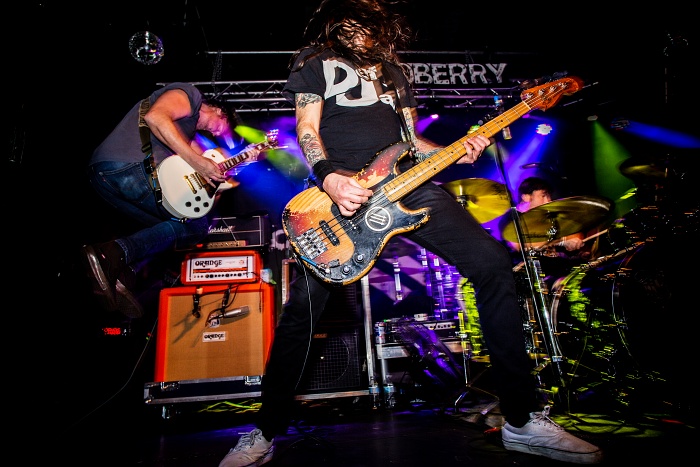
It’s pretty amazing to see it. Because it does feel like you see young folks, you see older white folks, you see older African-American folks, you see a lot of young kids. I’ve been going out in the morning and shooting the monuments and trying to shoot activity around the monuments, in the morning, seeing the aftermath, but also noticing who’s there.
You see families coming there, and then the most moving thing for me, honestly has been going to the Lee monument and this series of memorial cards about people who were murdered by the police.
God damn.
And it’s their story, and each one of them has turned into these shrines with flowers and candles. And then watching people with their kids go around and reading this stuff. It’s really, really impactful, and it’s a thing where a lot of people, they see the chaos and riot porn on TV or whatever.
But the aftermath, to me that is what is actually interesting. And like you said, there are all these grains of sand, or the quip someone I heard say was like, “why was the George Floyd thing the straw that broke the camel’s back?” And it’s like, well, it’s all the other straws that were beneath it.
Oh, for sure. And this time, obviously, the burner’s turned up because of the presidency, the time in American history. There’s so much exposure now and ways to communicate about these injustices, it’s harder and harder to turn away or to not know that it happened ‘cause it didn’t happen in front of you.
But there’s something about it where all these movements, all these people and all these tiny little moments like, “God damnit, why is it still like this?” Or people spend lifetimes feeling powerless and doing what they think they can do, and then you see what’s possible, and I think it’s ‘cause of that innate creativity pushes us towards justice.
Because if all these people are suffering, and now I know it, and now I can’t look away, this is not sustainable. I’m not safe, everyone I care about, and by extension people I will never meet and never know, if none of us are safe, none of us are free. That is a basic moral arithmetic that is now accessible to everyone in a new and lightning fast way.
I was thinking something you said earlier, this notion of not having vision of the possibility that these statues could be removed. You’re conditioned to being like, “Well, it’s just how it is,” that whole lost cause mythos is so ingrained in people in the South, and even people who resist that, you don’t think it’s possible that you could ever overcome that.
But then watching the Stonewall Jackson monument removal, which was the first one to go. I didn’t even know it was gonna happen. I was in the middle of work and I get this text and was like “What?” And I immediately got online, I found a live stream and it was just this beautiful moment.
I know. our roadie Josh was there live streaming it and I was just... I had to remind myself to breathe, it was like that intense, and it’s strange ‘cause the necessity of knowing you can change, knowing things can actually be improved. These traditions were imposed on us.
There is no context. It’s just this vision of this lost cause meant to separate people, divide, and then for working class Whites and middle class Whites in the South, it was their Prozac, they could use that to justify every loss, every imagined slight. All of that terrible pathology.
And then in pop culture, we’re assigning that to baby boomers, and that’s not a terrible thing, I don’t think that’s untruthful, but I think it’s more like the way that those cultural conditions are weaponized toward people to keep the racial divide there and to keep the moving target of who’s actually at fault, what is actually at fault, obscured.
And so, once these monuments fall, we’re actually in the present for the first time, and it was the context of people and not this 40-year period in the past that was then exploded and expanded to Jim Crow and Karen’s Daughters of the Confederacy.
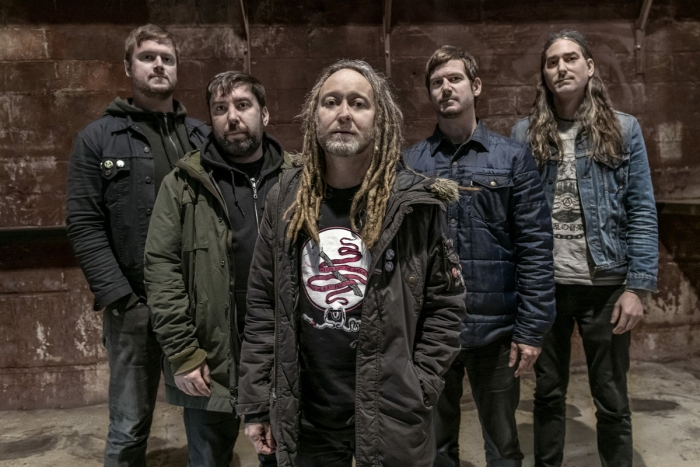
But can you imagine that stuff is now finally in the past? Instead of this... this hydra where you strike off one head and two grow back?
It took this insane loss of human life, and police brutality, and white nationalism giving a wink inside of law enforcement, inside of city politics forever. And it’s just like, they’re finally reaping what they sowed. You’re attached to this, this precious nonsense, this completely decontextualized and weaponized view. This is what you get. [chuckles] Molotov cocktails. And it’s definitely a sense of like, “Hey, we could have avoided all this if there was a great deal more honesty and justice.”
But the thing is, it’s not even the resentment and the bitterness and the grief of the actual war. This is something built out of whole cloth to manipulate and exploit and de-power everybody, 40 years later, that’s the same for 100 years after. That’s the crazy shit and that’s an easy thing to learn and understand. Why would you want to be manipulated like that?
It’s kind of like Trump. It’s kind of like all the other issues, like the pathologies of white people feeling like they’re losing some ground, and people who want to elevate that agenda and build a mass psychosis so they can have political capital. That’s been going on for a long-ass time.
The thing you said about it being Prozac for working class white folks…
And I think it’s been like that. There was something about post-Vietnam too, in the South. There was another turbocharge of this feeling, this weird equating of American hyper-patriotism with the Confederacy in some insane way. And I see that, Mike, ‘cause that’s my background, I’m Scots-Irish working-class white. My dad’s folks are from the Appalachians, my mom folks are from Tidewater and Norfolk. My mom grew up in an orphanage.
I see that shit 1000%. And luckily, my immediate family are all weird politically, but there’s nobody, that I know of, that this white nationalism resonates with. In fact 50% of my cousins married into black families, of course, as you do. And also I grew up.
There was a Caribbean population boom in Richmond in the ‘70s, that informed how I grew up, with some accident of history, with a lot of Jamaican families. The soccer coach was a Jamaican dad, there were jerk barbeque pits in the backyard of the particular suburb that I grew up in. Weird shit like that.
Also, that got really influenced into punk and reggae, the Richmond scene had a lot of... I would say curation, by the Caribbean population.
The Richmond that I grew up in had these tiny details to it that weren’t just about, “My legacy is being a redneck. Here I go.” There were these things that were happening, and transformations and culture, and I think Richmond’s art scene and punk, and all of the things that were happening in the ‘80s really captured it.
Just almost have the sense of, “God, this is something we can build together, that is more truthful, more honest, and includes all of us.”
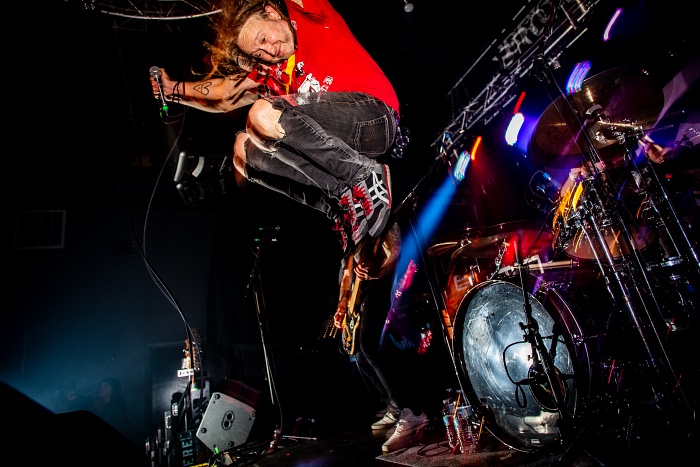
I think that’s something definitely I get out of your career as a lyricist and vocalist, that feeling of hope. Between Strike Anywhere and Inquisition, in your lyrics, there’s this notion of being able to overcome things.
One of the things I wanna talk about a little bit is this notion of entertainment as inspiration. I mean, for me, punk is more than just the music, more than just the lyrics, but about creating this alternative culture and making these strides for a better way of living.
Oh yeah, that’s exactly how I feel about it. Not even being in bands but in the tiny spaces between being in bands, I was still... it didn’t feel that different, because you’re participating. The whole idea that everyone’s the band. It’s just “Hey, we found this little door that we all share inside of us. We’re going to put the door here, and then we’re gonna walk through it together, and then everyone gets to show us what that room is like.”
That sounds kinda crazy and new-agey, but I mean it. Any art can do this, but the enthusiasm for everyone to partake and to make it something is so woven into punk DNA. And that’s why it’s naturally anti-capitalistic, that’s why it’s naturally unraveling the pathology of culture and nationalism, and all the things that punk is just always driven to do.
You’ve got punk that talks about pervert nurses and fun, weird stuff. There’s a lot of stuff in punk, I’m not saying it’s all... it’s not all political. It all needs to be there, for sure.
I mean, I am just as much a fan of stupid bands as I am of...
Right, and I think of that humility part of punk too is important. And obviously there’s been different moments. For a while there when Ebullition was just running shit in the ‘90s, I was like, “Oh God, I have to go back to school to figure some of this shit out. What are we talking about?” But I think that was necessary.
There’s definitely this beautiful... I don’t know, democracy has almost been destroyed, but there’s this level of, if we need something, the culture’s gonna find it. If we need a better nuance, if we need to figure out what this adaptation of third-wave feminism is, and we need to understand gender as a construct, like, “Oh shit, here are some bands that are gonna talk about that.” Right on time, and every time. That’s the weird thing, I feel like it is a gigantic collective project of creativity that naturally empowers the politics behind it.
One of the bands I think is so perfect is X-Ray Spex. Because they took incredibly beautiful intersectional feminism and racial politics and also just the consumerism and the horrific psychology that young women are put through, that queer women of color are put through.
And then they also made this strangely bittersweet, melancholy punk music that was really catchy. And they also had these really funny, funny scathing critiques. And I feel like this is one of the lost bands I really respect. And I loved them even before I knew words like intersectional feminism and racial politics, and that’s what we’re talking about I think.
We’re not gonna have very many people left in a movement if you just have to have a Master’s degree in Social Sciences to enjoy a record. But also, it’s good to be skeptical of what we call politics too. I think that there’s a tendency, it’s always just about this, the tidal pool that kills all life that is power.
So we consolidate things into a political platform and damn it, it’s just already on it’s way to dying. And it’s also not. It becomes a thing that drives people, instead of people driving it. Again, people’s needs, what the community really needs. That’s always the thing that’s ahead of politics. Politics is almost just the snapshot of the thing that’s moving.
I’m gonna try remember that, so that’s one of the songs on the record, “Dress the Wounds,” is trying to be about. But that was another thing that came up in the past ten years, probably. There’s that idea that, “Shit, everything that was wrong is still wrong, and somehow even more wrong.”
A lot of punk lyrics have that, and some of ours do, but there’s specific things about the changes in the past decade that we try to address on Nightmares of the West. Probably including, we probably wouldn’t have titled the record that until now.
Yeah, I actually was thinking we would just call it self-titled, and then the rhythm section was like, “No, this lyric, this line”, and I was like, “Okay.” So they found it before I did, and they were like, “Here’s why.” And that’s the fun thing about the collective experience of being in a band where everyone has a voice and has four editors for all the lyrics and it’s good.
It’s been eight eight years since Strike Anywhere has released a record, right?
Yeah. Eight years ago was with that period that I was in Richmond, that I was referencing. And we did an acoustic, we did two different acoustic shows that were recorded, and we made them into a record. The show in Richmond was a benefit for the Anarchist Black Cross, they were doing CopWatch filming and the police didn’t like that, and so several of our friends went to jail.
So, it was a prison fund for those guys. And anyway, yeah, so that wasn’t a studio record, obviously, that was just a weird collection of acoustic songs. We just thought it was a weird idea, but we did it, and it was cool. But yeah, before that, Iron Front came out in ‘09, so that was the last record. So a full decade.
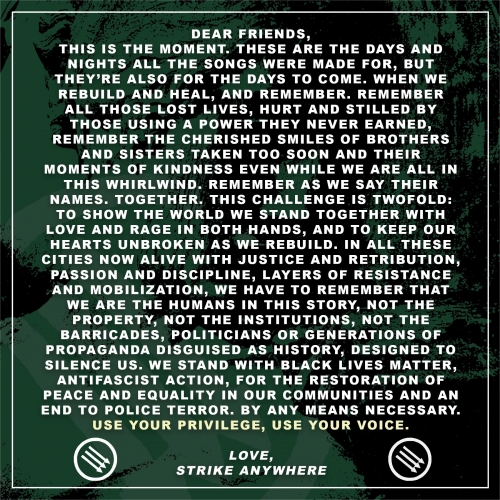
In doing my research, there was an article from 2016 when you were talking about working on a new record...
[laughter]
It’s true. Well, before the pandemic, we were just doing four, six weeks a year max, just distributed out across continents, countries and hometown shows, and things like that. For example, we haven’t been to the West Coast since 2011, but we’ve been through the East Coast and down to Florida almost every other year. So that’s just kind of where we’re concentrated in, what’s been happening.
But we had these little tiny song fragments and maybe riffs, and lyrics, and things that were in orbit. And bandmates had kids and some of them were doing what you would do, play guitar to put your 2-year-old to sleep, or just to amuse your 2-year-old, and hit record and sent it to me just as a funny little, “Hello, this is what I’m doing.”
And then my friend’s son was making some vocalizations, some kind of sing-song gibberish stuff, like kids, the old, primordial language before English. And they were in particular spots, so I just used that as a fun call-and-response, a way to mark the phrasing, and that’s the song that became “Dress the Wounds.” So that’s one example of how these things happen.
And then we’d take these pieces and ideas, and then workshop the fuck out of them during those long soundchecks in Europe, when there’s no one awake back at home and you’re jet lagged, and you’re just loaded into this venue, and 10 hours later you’re gonna play, so what are you gonna do with that time?
But also setting up in Richmond, at the bike lot practice space with the boys, and blasting through ideas and songs, and then other little groups would get together too, just the Richmond guys would work on some structures.
We also definitely have a thing where we’re not trying to make verbal plans with each other, like, “Hey, we gotta do a record, right?” “Yeah.” That conversation never happens. We never think we’re gonna do another thing. We don’t wanna put that expectation and that pressure. That’s not how we would do it.
And so anyway, yeah, it’s probably since ‘16, certain ideas and riffs and songs have been floating around, and then we’ve been working on them very slowly, but with purpose to get to this point. That’s just ‘cause we’re old and the band’s 20 years old. We need to figure out if it’s even important for, you know what I mean? To have another Strike Anywhere record or whatever, for us at least.
Is this worthwhile? Is it saying something new? Do we believe in it? Does it feel like it needs to feel? Just that stuff, building something where you want to look at it clear-eyed and then make sure that it’s what you wanna say, and it adds to the other 50 songs you already have that you torture people with.
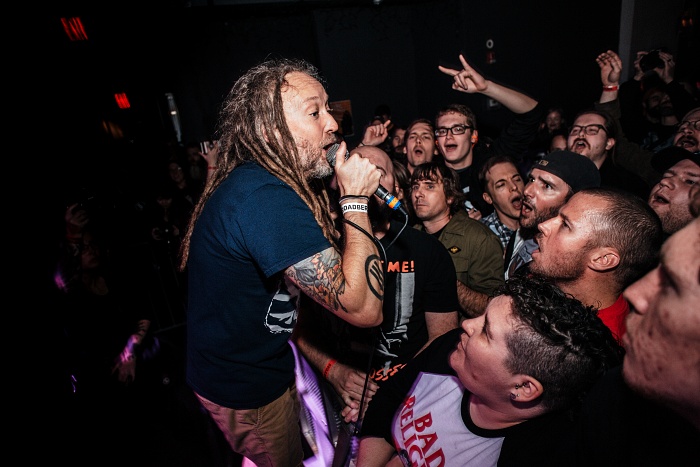
For me, as you get older, I think that there is an editing process for making things a little bit more fine-tuned, and you’re doing these kinds of projects where there’s not that stress of, “We have to put out a record, we have to tour. We have to put out a record, we have to tour.”
Yeah, yeah. There’s another part of this that cuts the other way, which is we need this more than ever. And this is who we’ve been for our whole adult lives and the end-part of teenage lives too, and this is how we communicate to the world, this is how we know who we are. It sounds weird and sad, and I don’t mean that in a way that’s sad. There’s tons of other roles that we have, careers, lives, projects, even bands. But this is more like...
It’s just like tapping into and adding to something that is still alive, and then being cut, being removed from it is painful and all that. So yeah, and I think also ‘cause your times are fucking crucial and they were also crucial... And the past four years have been horrible, right?
But it’s nothing directly about the president, and I think culturally, and the administration, and the moves of the law, and the separations of people, and all of the terrible, heartbreaking, mind-breaking stuff. It’s on 11 now, and during Obama’s presidency it was only nine.
There’s these general contours that would drive anyone to make a record worthy or anything to mentally survive the time and to feel like you’re not crazy, and to communicate with all the other people that also need to not feel like they’re crazy or alone. That’s a huge part of it. I mean, music is the place that you go while you’re by yourself. It soothes you and connects you. It soothes loneliness. It makes you feel even those things are endurable and everyone else is going through it.
So, with the psychological part of hardcore and punk, it is even more important and resonant as you become middle-aged. Maybe more even than as a teenager, when you were surrounded by people in your little sub-societies.
There is a snippet from an interview that you did where you talked about the songs on the new record. I’m gonna quote it back to you: “The conversations that we want to have and the feelings we really need to share.”
And there’s an interview you said something to that effect. And I think that as you get older, it’s harder to have those same conversations with people your same age. In my working life, it’s hard for me to let on about how just fucking pissed I am all the time.
[laughter]
Yeah. Fuck yeah.
You know what I mean? I’m 46 years old and just as angry as I was before, but it’s more honed than it was, it’s not just primal rage anymore. And sometimes for me, these songs, this being involved with punk still... it becomes a thing for me where it is that conversation that you’re talking about.
This is so good. And it’s also because this is a missing element of how we relate to each other, that we always have to fight to keep. It’s like another channel, another frequency that we have to communicate on. I think it’s biological. I think it’s our species, this is that creativity that naturally destabilizes power, that calls for honesty, that calls for unity. It does sound just like a political choice, that is something in our bones and our blood, and this is a place where the art isn’t commodified.
Sure there are consumer aspects to it, sure there is a give-and-take, there’s all kinds of levels that people do punk and hardcore at. And I think, “Oh, that’s fascinating too,” and we do several of those levels at once, but I think the necessity of it is to communicate.
In fact, as we get into the digital age and the immediacy of it, the pathology of how superficial it always is in every way. There’s even more of a need to have these kinds of connections where like, “You’re not alone in your anger. Got your back. I don’t understand myself, I don’t understand you, but we are the same.” Those kinds of emotions, those kinds of feelings are not in the world, except right in our culture. And as we get older, we can articulate that better.
I think we’re in an experimental generation because we’re the ones really carrying this all the way to the end. I mean, I keep up with the folks 10 years older than us, just to see how they’re holding up the totality of punk and hardcore, the ability for it to encompass these ideas. The toolbox, right?
We have access to the entirety of it because of the previous generations, no doubt, we’re standing on the shoulders of some giants and goddesses. But yeah, I think just to keep sustaining this and understanding why we need to is part of our particular role as we carry this into the future.
And yeah, I guess I just feel like the need to communicate, the need to discuss these ideas. There’s an emotional payload of catharsis, and then there is some truth, some social and some human truth that stand outside of like, “Vote for these idiots this election season.”
Holding contradictions in your hands is something we don’t do very well in America, especially, that fucks people up, causes all kinds of problems. Punk and hardcore have that, that we are all about that, reminding ourselves that we can do that, and that we can find what’s good and make it last.
All the other quotes by better bands that I always go back to. Having these songs out the world and desperately wanting to play them and not being able to is really painful. [chuckle]
It’s almost like people are missing that connection of being... we talked about it earlier. One of the big ways of being able to make those initial connections with people is through going to shows, and then those going to shows turn into you are having dinner together, or you’re having weird meetings underneath the [chuckle] monument. But that catalyst to be able to start making connections.
Yeah. When I see the photos of the plinths, just all covered in graffiti and the layers of graffiti and memorials, it’s just... I can’t even... Like, it’s crazy ‘cause there’s a song on Nightmares of the West called “The Bells,” and it is about me living in Richmond, walking around the city, nothing’s ever gonna be honest. Nothing’s ever gonna be new. Until the monuments fall.
And I had hoped that these discussions were blooming on that, after ‘17, basically. It’s like you write these songs that are aspirational and they’re also just like, this is the only way we’re gonna get to the root of some of these problems, like changing the landscape that people are in every day and removing these falsehoods. It’s just crucial. It’s just so important.
And anyway, seeing that stuff moves me in a way I can’t articulate, probably spend the rest of my life trying to describe the feeling, knowing that, “Oh my God, this is possible,” and this is what was needed, it’s just... it’s incredible...
I think having those monuments fall is a great thing and a needed thing, but it almost feels like... at times it feels like that’s the state being like, “Okay, here’s your token gesture…”
Yeah, yeah, yeah. You wanna make sure that this is not just this placating moment, this is the beginning of something, this is the beginning of something where we sustain the actual visible community. Deciding what their world is like. Deciding what we can all do together.
I guess that’s what I mean, it signifies that this entire structure has been burned down and now we’re just growing, flowers are growing up in the ashes, and it’s all of us and it’s beautiful and yeah, but you’re right, it can definitely be co-opted and taken away for sure.
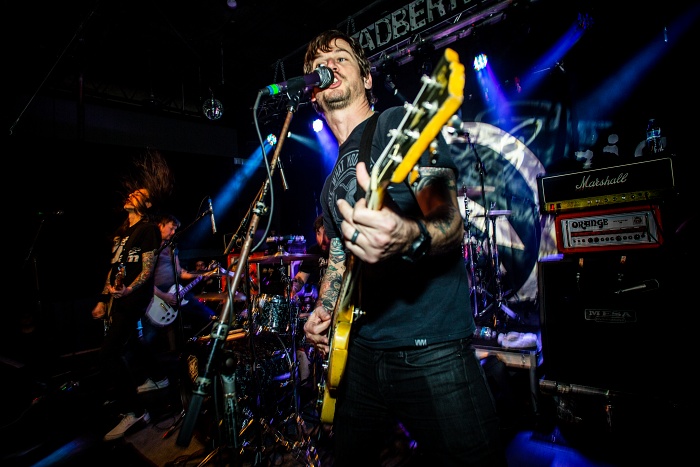
Yeah, and that’s the thing, to kinda keep eyes on the prize, so to speak. You don’t stop pushing. I hope people don’t go, “Okay, well, the monuments are gone now, it’s fine.” I hope it keeps going, it’s always kind of a push towards a better and more just world. Right?
Right. I think, in a way, this is a moment that’s beyond symbolism, but it definitely is a touchstone for that. “This can happen, they can’t take that back.” And now, we can continue to have this space that gets ever bigger and more empowered for everybody.
That’s kind of what it looks like to me. It’s like a lightning strike on the Robert E. Lee statue, and then everybody else gets the power from it, while that dissolves and melts.
***
Nightmares of the West is available now via Pure Noise Records.
This interview originally appeared in the Issue #10 of Razorblades and Aspirin, which you can order here.
***
Donate a few bucks to help with No Echo's operating costs:
***
Tagged: strike anywhere



